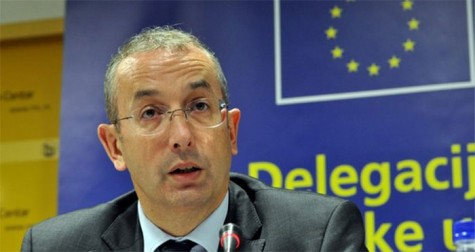Head of the EU Delegation to Serbia Michael Davenport said maintaining peace was a great motive of the entire region on its path to the EU, but this underlying EU value should not be taken for granted.
“People sometime say there is no alternative to Serbian process of European integration. I neither think this sums up such a huge effort properly, nor do I think it is a good motive. Countries in the region, such as Serbia, which have exited the chaos and self-destruction of the 1990’s should be highly motivated to follow the EU path,” Davenport said.
At the international session “Serbia and European integration of the Western Balkans – Exchange of views ahead of Paris conference on the Western Balkans,” Davenport said the EU could not afford to take the achievements in maintaining peace for granted, because these achievements have made the war between countries unimaginable and this should be kept in mind at all times, especially when talking about Western Balkans.
Head of the EU Delegation to Serbia said the relations among the countries in the region have advanced greatly. “Huge progress has been made in bilateral relations between Serbia and other countries in recent years. Two or three years ago, who would have thought this level of inclusive regional cooperation would have been achieved within the Western Balkans Six or within the Berlin Process?”
Davenport added that the next challenge was to “flesh out” this framework and said it was possible. “Europe needs Serbia, European Union will not be complete without Serbia and other Western Balkans countries, but EU Member States need to see the countries in the region contributing to security and prosperity,” said EU Ambassador Davenport.
He stressed that preparations for chapters might seem as a purely bureaucratic task, but they are really not because drafting of action plans for chapters 23 and 24 have required “unprecedented level of consultation with civil society” and added that the preparation of action plans is merely the start of achieving goals and efficient reform.
Advisor to President of French Institute for International Relations IFRI Dominique David said the Western Balkans and relations of countries in the region with Russia were important for the stability of Europe as a whole.
“Ukrainian crisis has shaken the entire continent up and reminded us that EU-Russia relations largely affect the stability of the continent. Balkan issue and relations between Serbia and our major Eastern neighbourhood play a significant role,” said IFRI expert.
Minister of Foreign Affairs of Bosnia and Herzegovina Igor Carnadak said peace dimension was a key motive for countries in the region to join the EU which was why they were more motivated than other countries which had followed the same path.
As additional motives, he cited economic transition and the rule of law, and added current BiH government was driven by these motives because people were highly dissatisfied with economic situation.
He thanked Serbia for its support in the process of European integration because, as he put it, Serbia was a few steps ahead of BiH in this process.
The conference “Serbia and European integration of the Western Balkans – Exchange of views ahead of Paris conference on the Western Balkans” was organised by French–Austrian Centre for European Convergence in cooperation with European Fund for the Balkans, European Movement in Serbia and French Institute for International Relations IFRI from Paris.





